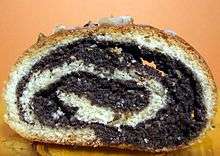Poppy seed
Poppy seed is an oilseed obtained from the opium poppy (Papaver somniferum). The tiny, kidney-shaped seeds have been harvested from dried seed pods by various civilizations for thousands of years. It is still widely used in many countries, especially in Central Europe, where it is legally grown and sold in shops. The seeds are used whole or ground into meal as an ingredient in many foods – especially in pastry and bread – and they are pressed to yield poppyseed oil.
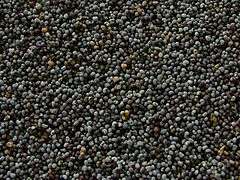
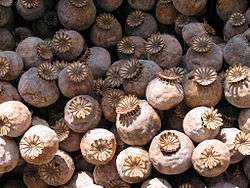
History
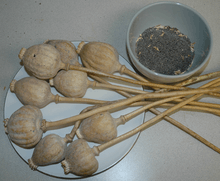
The poppy seed is mentioned in ancient medical text from many civilizations. For instance, the Egyptian papyrus scroll named Ebers Papyrus, written c. 1550 BC, lists poppy seed as a sedative.[1] The Minoan civilization (approximately 2700 to 1450 BC), a Bronze Age civilization which arose on the island of Crete, cultivated poppies for their seed, and used a milk, opium and honey mixture to calm crying babies. The Sumerians are another civilization that are known to have grown poppy seeds.[2]
Seed description
_crop.jpg)
Poppy seeds are less than a millimeter in length, kidney-shaped, and have a pitted surface.[3] It takes 3,300 poppy seeds to make up a gram, and between 1 and 2 million seeds to make up a pound.[2] The primary flavor compound is 2-Pentylfuran.[4]
The seeds of other poppy types are not eaten, but they are cultivated for the flowers they produce. Annual and biennial poppies are considered a good choice to cultivate from seed as they are not difficult to propagate by this method, and can be put directly in the ground during January.[5] The California poppy (Eschscholzia californica), for example, is a striking orange wildflower that grows in the Western and Northwestern United States.
World production
| Poppy seed production – 2016 | |
|---|---|
| Country | (tonnes) |
| Source: FAOSTAT of the United Nations[6] | |
In 2016, world production of poppy seeds was 92,610 tonnes, led by the Czech Republic with 31% of the world total, followed by Turkey and Spain as other major producers (table).[6]
The poppy seeds harvest can be a by-product of cultivation of Papaver somniferum for opium, poppy straw, or both opium and poppy straw. However, harvesting for poppy seeds of superior quality is in conflict with harvesting for opium as poppy seeds should be harvested when they are ripe, after the seed pod has dried. Traditionally, opium is harvested while the seed pods are green and the seeds have just begun to grow and their latex is abundant. Poppy straw can be a by-product of cultivation of poppy seeds. Compared to the seed pod and straw, the seeds contain very low levels of opiates.[7] The seeds may be washed to obtain poppy tea but a large amount is needed, around 300-400g depending on the levels of opiates.
Since poppy seeds are relatively expensive, they are sometimes mixed with the seeds of Amaranthus paniculatus, which closely resemble poppy seeds.[8]
Nutrition
 | |
| Nutritional value per 100 g (3.5 oz) | |
|---|---|
| Energy | 2,196 kJ (525 kcal) |
28.13 g | |
| Sugars | 2.99 g |
| Dietary fiber | 19.5 g |
41.56 g | |
| Saturated | 4.517 g |
| Monounsaturated | 5.982 g |
| Polyunsaturated | 28.569 g |
21.22 g | |
| Vitamins | Quantity %DV† |
| Vitamin A equiv. | 0% 0 μg0 μg |
| Vitamin A | 0 IU |
| Thiamine (B1) | 74% 0.854 mg |
| Riboflavin (B2) | 8% 0.100 mg |
| Niacin (B3) | 6% 0.896 mg |
| Pantothenic acid (B5) | 0% 0 mg |
| Vitamin B6 | 19% 0.247 mg |
| Folate (B9) | 21% 82 μg |
| Choline | 11% 52.1 mg |
| Vitamin C | 1% 1 mg |
| Vitamin E | 12% 1.77 mg |
| Vitamin K | 0% 0.0 μg |
| Minerals | Quantity %DV† |
| Calcium | 144% 1438 mg |
| Copper | 0% 0 mg |
| Iron | 75% 9.76 mg |
| Magnesium | 98% 347 mg |
| Manganese | 109% 2.285 mg |
| Phosphorus | 124% 870 mg |
| Potassium | 15% 719 mg |
| Selenium | 0% 0 μg |
| Sodium | 2% 26 mg |
| Zinc | 74% 7.0 mg |
| Other constituents | Quantity |
| Water | 5.95 g |
| |
| †Percentages are roughly approximated using US recommendations for adults. Source: USDA Nutrient Database | |
In a 100 gram amount, poppy seeds provide 525 Calories and are a rich source of thiamin, folate, and several essential minerals, including calcium, iron, magnesium, manganese, phosphorus and zinc (table). Poppy seeds are composed of 6% water, 28% carbohydrates, 42% fat, and 21% protein (table).
Food products
Intact seeds
Whole poppy seeds are widely used as a spice and decoration in and on top of many baked goods and pastries. In North America they are used in and on many food items such as poppyseed muffins, rusk, bagels (like the Montreal-style bagel), bialys, and cakes such as sponge cake. Poppy seeds can also be used like sesame seeds, added to hamburger buns or to make a bar of candy. The bars are made from boiled seeds mixed with sugar or with honey. This is especially common in the Balkans, Greece and even in the cuisines of former Austro-Hungarian countries.
The color of poppy seeds is important in some uses. According to The Joy of Cooking, "the most desirable come from Holland and are a slate-blue color."[9] When used as a thickener in some dishes, white poppy seeds are preferred, having less impact on the color of the food. In other dishes, black poppy seeds are preferred, for maximum impact. Blue poppy seeds are used in various German breads and desserts as well as in Polish cuisine.
Paste
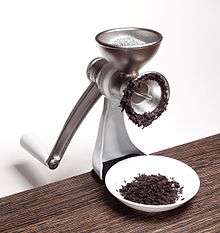
Poppy seeds can be ground using a generic tool such as a mortar and pestle or a small domestic type electric blade grinder, or a special purpose poppy seed grinder. A poppy seed grinder (mill) is a type of burr grinder with a set aperture that is too narrow for intact poppy seeds to pass through. A burr grinder produces a more uniform and less oily paste than these other tools.
The poppy seed paste is used for fillings in pastries, sometimes mixed with butter or milk and sugar. The ground filling is used in poppy seed rolls and some croissants and may be flavored with lemon or orange zest, rum and vanilla with raisins, heavy cream, cinnamon, and chopped blanched almonds or walnuts added. For sweet baked goods, sometimes instead of sugar a tablespoon of jam, or other sweet binding agent, like syrup is substituted. The poppy seed for fillings are best when they are finely and freshly ground because this will make a big difference in the pastry filling's texture and taste.
Poppy seed paste is available commercially, in cans. Poppy seeds are very high in oil, so commercial pastes normally contain sugar, water, and an emulsifier such as soy lecithin to keep the paste from separating. Commercial pastes also contain food preservatives to keep them from becoming rancid.
In the United States, commercial pastes are marketed under brand names including Solo and American Almond. Per 30 gram serving, the American Almond poppy seed paste has 120 calories, 4.5 grams fat, and 2 grams protein.
Oil
Poppy seeds are pressed to form poppyseed oil, a valuable commercial oil that has multiple culinary and industrial uses.
Other uses
Poppy seeds are often used as bird seed, in which case they are usually called maw seeds.[10]
Use by cuisine
Poppy seeds are used around the world in various cuisines.
European cuisine
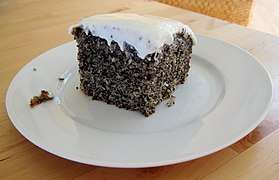
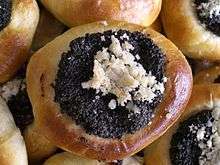
Across Europe, buns and soft white bread pastries are often sprinkled on top with black and white poppy seeds (for example cozonac, kalach, kolache and kołacz). The seeds of the Czech blue poppy (food safety cultivars Papaver somniferum) are widely consumed in many parts of Central and Eastern Europe. The sugared, milled mature seeds are eaten with pasta, or they are boiled with milk and used as filling or topping on various kinds of sweet pastry. Milling of mature seeds is carried out either industrially or at home, where it is generally done with a manual poppy seed mill.
Blue poppy seeds are widely used in Austrian, Croatian, Czech, German, Hungarian, Lithuanian, Polish, Romanian, Russian, Serbian, Slovak, Turkish and Ukrainian cuisines.
The states of former Yugoslavia (notably North Macedonia and Serbia, but also Croatia and Bosnia) have a long tradition of preparing poppy seed pastry (štrudla, baklava, pajgle) and dishes (pasta with poppy seeds).
In Poland, Lithuania and Eastern Slovakia, a traditional dessert is prepared for the Kūčios (Christmas Eve) dinner from poppy seeds. They are ground and mixed with water or milk; round yeast biscuits (kūčiukai in Lithuanian; opekance or bobalky in Slovak) are soaked in the resulting poppy seed 'milk' (poppy milk) and served cold.
In Central Europe, poppy strudel is very popular, especially during Christmas. In Germany, Poland and countries belonging to the former Austro-Hungarian Empire, poppy seed pastries called Mohnkuchen are often eaten around Christmas time.[11] Recipes for Mohnstriezel use poppy seed soaked in water for two hours[12] or boiled in milk. A recipe for Ukrainian poppyseed cake recommends preparing the seeds by immersing in boiling water, straining and soaking in milk overnight.[13]
Jewish cuisine
In Eastern European Jewish cuisine, pastries filled with black poppy seeds in a sugary paste are traditional during Purim, which occurs exactly one month before Passover and approximately a month before Easter. Traditional pastries include poppy seed kalács and hamantashen, both sometimes known as beigli (also spelled bejgli). Poppy seed hamantashen were the main traditional food eaten by Ashkenazi Jews at Purim until the filling was replaced by other fruit and nut fillings. Poppy seed pastries are common in Jewish bakeries and delicatessens throughout the United States.
Indian cuisine
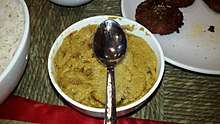
In Indian cuisine, white poppy seeds are added for thickness, texture and flavor to recipes. Commonly used in the preparation of korma, ground poppy seeds, along with coconut and other spices, are combined into a paste added during cooking. Poppy seeds are widely used in many regional Indian cuisines. One dish is aloo posto (potato and poppy seeds) which consists of ground poppy seeds cooked together with potatoes and made into a smooth, rich product, which is sometimes eaten with rice. There are many variants to this basic dish, replacing or complementing the potatoes with other ingredients, such as onions (pnyaj posto), pointed gourd (potol posto), Ridged Luffa (jhinge posto), chicken (murgi posto), and prawns (chingri posto). Chadachadi is a dish from Bengali cuisine and includes long strips of vegetables, sometimes with the stalks of leafy greens added, all lightly seasoned with spices like mustard or poppy seeds and flavored with a phoron. One dish involves grilling patties made from posto, sometimes frying them (posto-r bora). Another dish involves simply mixing uncooked ground poppy seeds (kancha posto) with mustard oil, chopped green chili peppers, fresh onions and rice. Kacha posto bata (uncooked poppy seeds paste) with mustard oil is a very popular dish in West Bengal as well as Bangladesh. Poppy seeds are widely used in Kashmir as a topping on various breads, especially kulcha.
Poppy seeds, along with tulsi (basil) seeds, are added to beverages such as thandai, sharbat, milkshakes, rose milk, almond milk and khus khus milk.
Health effects
Eating large quantities of poppy seeds can cause a phytobezoar which can block the bowels,[14] though this is unlikely if the seeds are consumed in moderation as an ingredient in cooked or baked foods.[15][16]
Allergy (type 1 hypersensitivity) to poppy seeds is rare, but has been reported[17][18] and can cause anaphylaxis.[18]
False positive drug tests
Although the drug opium is produced by "milking" latex from the unripe fruits ("seed pods") rather than from the seeds, all parts of the plant can contain or carry the opium alkaloids, especially morphine and codeine. This means that eating foods (e.g., muffins) that contain poppy seeds can result in a false positive for opiates in a drug test. However the results provided will not be the same for someone who uses opiates.[19][20]
Morphine levels in poppy seeds range between 4–200 mg/kg. According to an article published in the Medical Science Law Journal, after ingesting "a curry meal or two containing various amounts of washed seeds" where total morphine levels were in the range 58.4 to 62.2 µg/g seeds, the urinary morphine levels were found to range as high as 1.27 µg/mL (1,270 ng/mL) urine.[21] Another article in the Journal of Forensic Sciences reports that concentration of morphine in some batches of seeds may be as high as 251 µg/g.[22] In both studies codeine was also present in the seeds in smaller concentrations. Therefore, it is possible to cross the current standard 2,000 ng/mL limit of detection, depending on seed potency and quantity ingested. Some toxicology labs still continue to use a cutoff level of 300 ng/mL.[23]
Discovery Channel's MythBusters series episode "Poppy Seed Drug Test"[24] demonstrated that eating both poppy seed bread and poppy seed bagels resulted in both of the hosts testing positive for opiate use, 30 minutes later.
To minimize the problems caused by false positives for competitive athletes, the USADA recommends that competitive athletes refrain from eating foods containing poppy seeds several days prior to a competitive event.[25]
A fictional example of such a false positive test in popular culture was in the Seinfeld episode "The Shower Head", where the character Elaine Benes was not allowed to visit Kalahari Bushmen with J. Peterman after testing positive for opium from the consumption of poppy seed muffins.
Prohibitions
The sale of poppy seeds from Papaver somniferum is banned in Singapore because of the morphine content. Poppy seeds are also prohibited in Taiwan, primarily because of the risk that viable seeds will be sold and used to grow opium poppies.[26] China prohibits spice mixes made from poppy seed and poppy seed pods because of the traces of opiates in them, and has since at least 2005.[27][28] Despite its present use in Arab cuisine as a bread spice, poppy seeds are also banned in Saudi Arabia for various religious and drug control reasons.[29] In one extreme case in the United Arab Emirates, poppy seeds found on a traveler's clothes led to imprisonment.[30][31] Concerns were raised in Malaysia by MP Datuk Mohd Said Yusof who claimed in 2005 that mamak restaurants used poppy seeds in their cooking to get customers addicted to it.[32]
International travelers
As poppy seeds cause false positive results in drug tests, it is advised in airports in India not to carry such items to other countries, where this can result in punishments based on false positive results. Travelers to the United Arab Emirates are especially prone to difficulties and severe punishments.[33][34]
In Singapore, poppy seeds are classified as "prohibited goods" by the Central Narcotics Bureau (CNB).[35]
Gallery
- Dried poppy seed pods next to glass jars of blue, gray, and white poppy seeds used for pastries in Germany
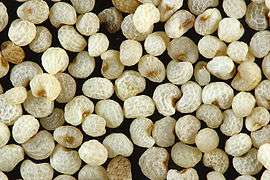 White poppy seeds, close up
White poppy seeds, close up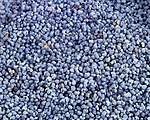 Czech blue poppy seeds (as food)
Czech blue poppy seeds (as food)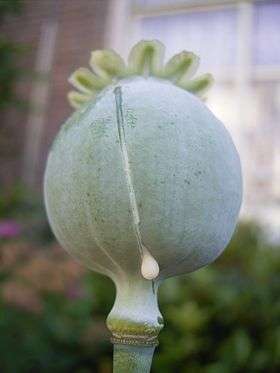 A cut green seed pod with fresh latex
A cut green seed pod with fresh latex Electron micrograph of a poppy seed
Electron micrograph of a poppy seed Energy-dispersive X-ray analysis showing high content of calcium and other mineral elements in the seed
Energy-dispersive X-ray analysis showing high content of calcium and other mineral elements in the seed
References
- Raghavan, Susheela (2006). Handbook of spices, seasonings, and flavorings. CRC Press. p. 158. ISBN 978-0-8493-2842-8.
- McGee, Harold (2004). On Food and Cooking: The Science and Lore of the Kitchen. Simon and Schuster. p. 513. ISBN 978-0-684-80001-1.
- Yearbook of Agriculture. United States Government Printing Office. 1896. p. 203.
- Yiu H. Hui, Handbook of Food Science, Technology, and Engineering. CRC Press 2006. ISBN 0-8493-9848-7
- "Poppy, chamomile and larkspur seeds are planted outside in January." Day, Molly (2009-01-14). "Gardening: Work to get seeds started in January". Muskogee Phoenix. Retrieved 2009-01-24.
- "Poppy seed production in 2016, Crops/Regions/World list/Production Quantity (pick lists)". UN Food and Agriculture Organization, Corporate Statistical Database (FAOSTAT). 2017. Retrieved 10 June 2018.
- "Poppy law" on Erowid.org
- Singhal, Rekha S.; Pushpa R. Kulkarni; Dinanath V. Rege (1997). Handbook of Indices of Food Quality and Authenticity. Woodhead. p. 414. ISBN 978-1-85573-299-5.
- Irma S. Rombauer; Marion Rombauer Becker; Ethan Becker (2006). The Joy of Cooking. New York: Scribner. p. 1011. ISBN 978-0-7432-4626-2.
- Ward, Artemas (1911). The Grocer's Encyclopedia (1st ed.). New York, New York: James Kemster Printing Co. pp. 492–495. Retrieved July 5, 2014.
- "Poppy Seed Moon Cake or Makosbeigli," in Meyer, June (1998). June Meyer's Authentic Hungarian Heirloom Recipes. Meyer & Assoc. ISBN 978-0-9665062-0-4.
- Mohnstriezel-Poppy-Seed-Cake. Recipezaar.com. Retrieved on 2015-04-24.
- Walter, Joyce (2009-01-10). "Ukrainian community in midst of celebrations". The Moose Jaw Times Herald (Saskatchewan). Archived from the original on 2009-03-02. Retrieved 2009-01-24.
- "Poppy Seed » Side Effects". WebMD.
Eating very large amounts of poppy seeds is also possibly unsafe. Eating very large amounts of poppy seed can block the bowels. But this is very uncommon.
Citing: "Poppy seed". Natural Medicines Comprehensive Database Consumer Version. Therapeutic Research Center, LLC. - somniferumphile. Comment. Reddit, Inc.
Phytobezoars will only occur if a large volume of seeds are consumed, or if they are not chewed up sufficiently enough. Phytobezoars will not occur if you're eating seeds as part of another food, such as lemon poppyseed muffins, in which there is enough material of different textures to safely pass through your digestive system. One main reason phytobezoars form from seeds is due to their spherical shape, which predisposes them to aggregate around each other in the absence of other food. Another is their hard coat, which resists being broken down in our digestive system. If you chew them, they are no longer spheres, and their hard coats are broken down to expose their contents, thereby providing a variation of textures to assist digestion, including the seed embryo, providing protein and oil.
- somniferumphile. Frequently Asked Questions. Reddit, Inc.
Whole seeds contain oils which have reportedly made some ... quite ill due to stomach cramping and vomiting. Ingesting quantities of whole seeds can also cause the development of phytobezoar, an extremely painful and lethal intestinal blockage. If you wish to eat whole seeds, keep the amount under 30g maximum, in order to minimize these symptoms and risk of fatal phytobezoars. We also advise not to eat whole seeds more than one day in a row, due to the compounded risks of constipation and phytobezoars. If you experience extreme abdominal pain after consuming whole seeds, please go to the nearest emergency room, or call [an ambulance].
- Keskin O, Sekerel BE; Sekerel (2006). "Poppy Seed Allergy: A case report and review of the literature". Allergy and Asthma Proceedings. 27 (4): 396–8. doi:10.2500/aap.2006.27.2881. PMID 16948357.
- Panasoff J (2008). "Poppy seed anaphylaxis". Journal of Investigational Allergology and Clinical Immunology. 18 (3): 224–5. PMID 18564637.
- O'Connor, Anahad (2005-01-11). "The Claim: Eating Poppy Seeds Can Make You Fail a Drug Test". The New York Times.
- Blau, Reuven (December 27, 2018). "City jail officer reinstated after getting booted for failing drug test marred by poppy seed bagel breakfast". nydailynews.com. Retrieved December 28, 2018.
- Opiated curry. Opioids.com. Retrieved on 2015-04-24.
- Poppy-seeds: codeine, morphine and urinanalysis. Opioids.com. Retrieved on 2015-04-24.
- Detection of Opiates in Urine – Toxicology Laboratories – HealthWorld Online. Healthy.net. Retrieved on 2015-04-24.
- Poppy Seed Drug Test MiniMyth | MythBusters | Discovery. Dsc.discovery.com (2011-02-11). Retrieved on 2015-04-24.
- "Can athletes eat poppy seeds without testing positive?". United States Anti-Doping Agency. 2014-02-10.
- "Court convicts bagel shop owner over poppy seeds - Taipei Times". Retrieved 20 April 2017.
- "Controls over poppy seed strengthened". Asia Times. October 18, 2005. Retrieved April 20, 2017.
- "In China, poppy seedpod is a spice too hot to handle". 21 October 2013. Retrieved 20 April 2017 – via LA Times.
- Ignorance Is No Excuse for Breaking Law. Arabnews.com (2006-01-10). Retrieved on 2015-04-24.
- Tourists warned of UAE drug laws. BBC News (2008-02-08). Retrieved on 2015-04-24.
- "List Of Controlled Pharmaceutical Substances In UAE". Fair Trials International. Archived from the original on 2014-10-18.
- "Health Ministry: Kas-kas won't be banned in Malaysia yet". The Rakyat Post. 14 April 2016. Archived from the original on 17 June 2016. Retrieved 2 May 2016.
- Travel Warning – Khas Khas (Poppy Seed) Imprisonment in UAE. Hoax-slayer.com. Retrieved on 2015-04-24.
- "Indian in UAE denies using poppy seeds as drugs". Yahoo News India. IANS. July 10, 2014. Archived from the original on March 5, 2016. Retrieved July 17, 2014.
- "I would like to know if I am allowed to bring poppy seeds into Singapore for my baking business". Retrieved 31 August 2015.
Further reading
- Jenő Bernáth. Poppy: The Genus Papaver. CRC Press, 1998. ISBN 978-90-5702-271-5.

